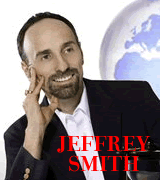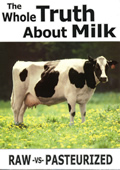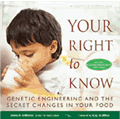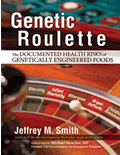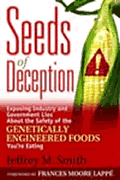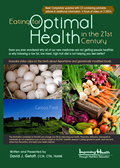KANSAS GOVERNOR MUST VETO BILL THAT ENDANGERS MILK SAFETY
By
Jeffrey Smith
April 8, 2009
NewsWithViews.com
Governor Sebelius wants to be our new Secretary of Health and Human Services. But before she is sworn in, she has an important job to do, which will demonstrate that she is serious about protecting the safety of our food supply. A bill passed the Kansas legislature on April 3rd, which would restrict any national US dairy from properly labeling their milk products as free from genetically engineered bovine growth hormone (rbGH or rbST). Governor Sebelius must veto it before the April 16th deadline.
Send Governor Sebelius an email urging her to do so.
Here is the first in a multi-part series explaining why Drugged Milk is dangerous, and how corporate manipulation, bad science, and political collusion pushed it into our food supply.
Also check out the 18-minute documentary Your Milk on Drugs—Just Say No! to see:
1
- An FDA scientist who demanded more safety studies on rbGH,
but was fired for holding up its approval.
2 - A FOX TV investigative reporter whose news series
linking rbGH to cancer was canceled after the station received letters
from Monsanto’s attorney threatening “dire consequences
for Fox News.”
3 - Canadian government scientists who wrote a scathing
critique of the FDA’s flawed and biased evaluation of rbGH, and
then testified about political pressure, stolen evidence, and an alleged
bribe offer from Monsanto.
4 - Rigged research from the drug’s maker, meticulously
designed to cover up health problems.
5 - A scientist who did rbGH research for Monsanto,
and then became the drug’s lead reviewer at the FDA.
6 - Michael Taylor, Monsanto’s former attorney,
who was in charge of FDA policy when rbGH was approved. He later became
Monsanto’s vice president.
Get Our Milk Off Drugs, Part 1
Milk from rbGH-treated cows may increase risk of cancer
Growth hormones are created in the pituitary gland. Back in the 1930s, they discovered that injecting cows with their own pituitary extracts boosted milk production. But the process was too expensive and not commercially viable—until genetic engineering came along.
Monsanto scientists took the cow gene that creates growth hormones, altered it, and inserted it into E. coli bacteria to create a living drug factory. The bacteria-created hormone is similar, but not identical to the naturally occurring variety. Monsanto marketed it under the brand name Posilac. It is also called recombinant bovine growth hormone (rbGH) or recombinant bovine somatotropin (rbST).When injected into a cow, it boosts their whole metabolism. Milk production goes up by about 5%. But cows often get sick and die young.
Approved in the United States in 1993, by 2002 rbGH was used on 22% of the nation’s dairy cows. It is banned in the European Union, Canada, Australia, New Zealand, and Japan.
Milk from treated cows is different from normal milk. It has more pus, more antibiotics, more bovine growth hormone, and most importantly, higher levels of the hormone insulin-like growth factor 1 (IGF-1). IGF-1 is one of the most powerful growth hormones in the human body and is naturally present in cows’ milk.
Milk drinkers increase their IGF-1 levels. One study showed a 10% increase. Another, analyzing diets of more than 1,000 nurses, showed milk was the food most associated with high IGF-1 levels. Neither of these studies used milk from cows treated with rbGH. If they had, the results may have been considerably more significant, since levels of IGF-1 in milk from treated cows can be up to 10 times higher, and according to rbGH expert Samuel Epstein MD, detection methods may underestimate the amount and impact of this increase by up to forty fold.
High IGF-1 levels is a huge cancer risk, according to more than three dozen studies. A Harvard study of 15,000 white males found those with elevated blood levels to be four times more likely to get prostate cancer than average men. In a Lancet study, premenopausal US women below age 50 with high IGF-1 levels were seven times as likely to develop breast cancer. “With the exception of a strong family history of breast cancer,” the authors warned, “the relation between IGF-1 and risk of breast cancer may be greater than that of other established breast cancer risk factors.” The International Journal of Cancer described a “significant association between circulating IGF-1 concentrations and an increased risk of lung, colon, prostate, and pre-menopausal breast cancer.” A 1999 European Commission report concluded: “Avoidance of rbGH dairy products in favor of natural products would appear to be the most practical and immediate dietary intervention to . . . (achieve) the goal of preventing cancer.”
There are a few ways in which IGF-1 may promote cancer. It causes cells to divide. It reduces programmed cell death (apoptosis) in tumor cells. And it inhibits the ability of various anti-cancer drugs to kill cultured human breast cancer cells.
The link between IGF-1 and cancer prompted the American Nurses Association to call for the elimination of rbGH in dairy production. The American Medical Association’s past president urged hospitals to serve only rbGH-free milk, and over 160 hospitals have already pledged to do so. Schools nationwide have also banned drugged milk.
Consumer reaction has prompted a tipping point in the dairy industry. Over the last three years, companies such as Wal-Mart, Starbucks, Dannon, Yoplait, and more than half of the nation’s top 100 dairies have committed to stop using rbGH in some or all of their products. But the Kansas legislation, if not vetoed by Governor Sebelius, would require all brands that sell rbGH-free in the state, including national brands, to add a large and deceptive disclaimer to their package which falsely claims that rbGH does not change the quality of the milk. The bill even dictates the placement of the disclaimer. This would likely discourage some dairies from making rbGH-free claims on their package. And without that, they might also abandon their rbGH-free status altogether.
|
Subscribe to the NewsWithViews Daily News Alerts! |
In short, this misguided legislation may ultimately take away your choices for healthier milk and promote cancer.
Please email Governor Sebelius, asking her to veto this misguided bill, before the April 16th deadline.
Also check out the video. Drink rbGH-free milk. And check back with Jeffrey Smith’s blog on Huffington Post for more to come on rbGH, including hijacked regulators, fired whistleblowers, suppressed news coverage, and more.

